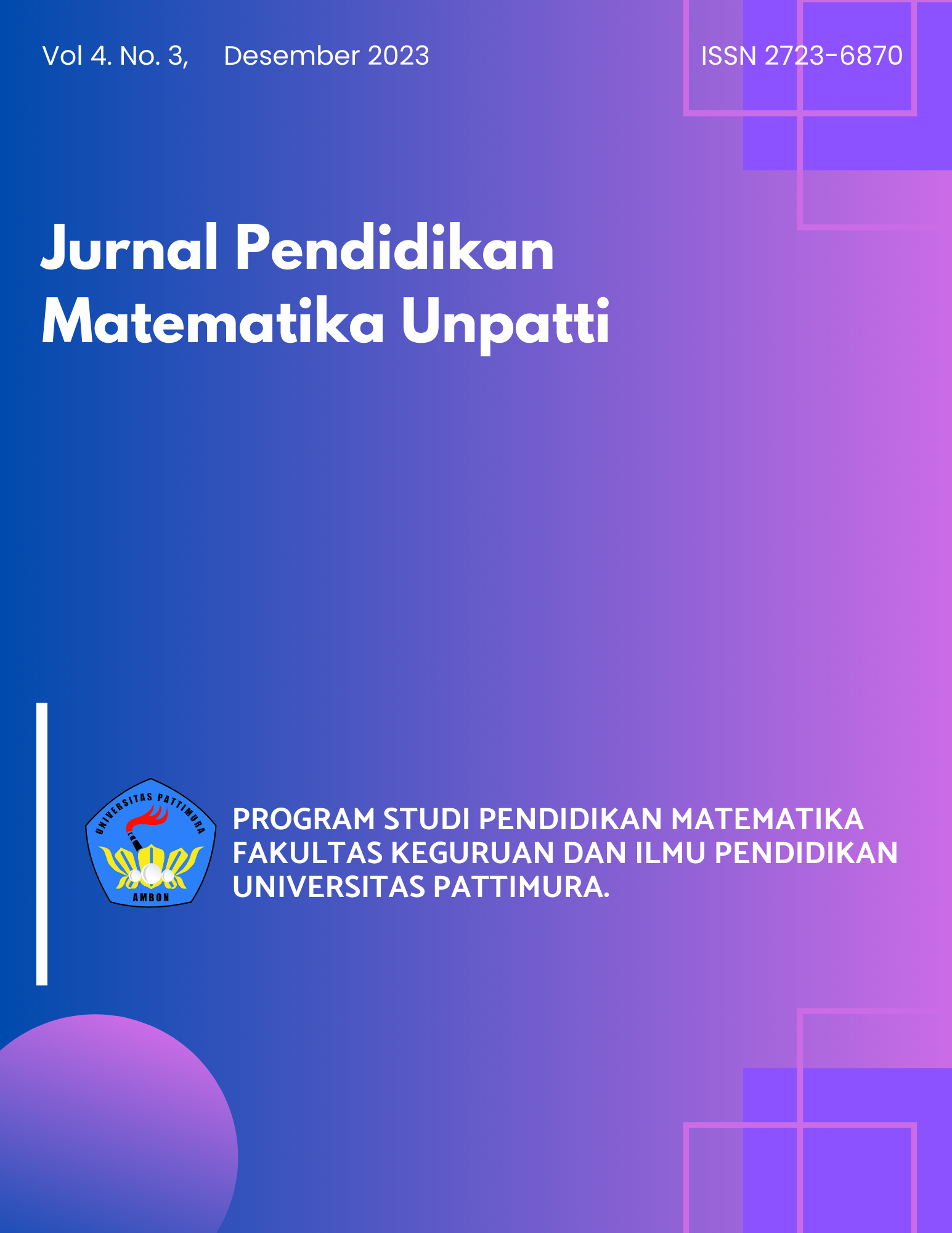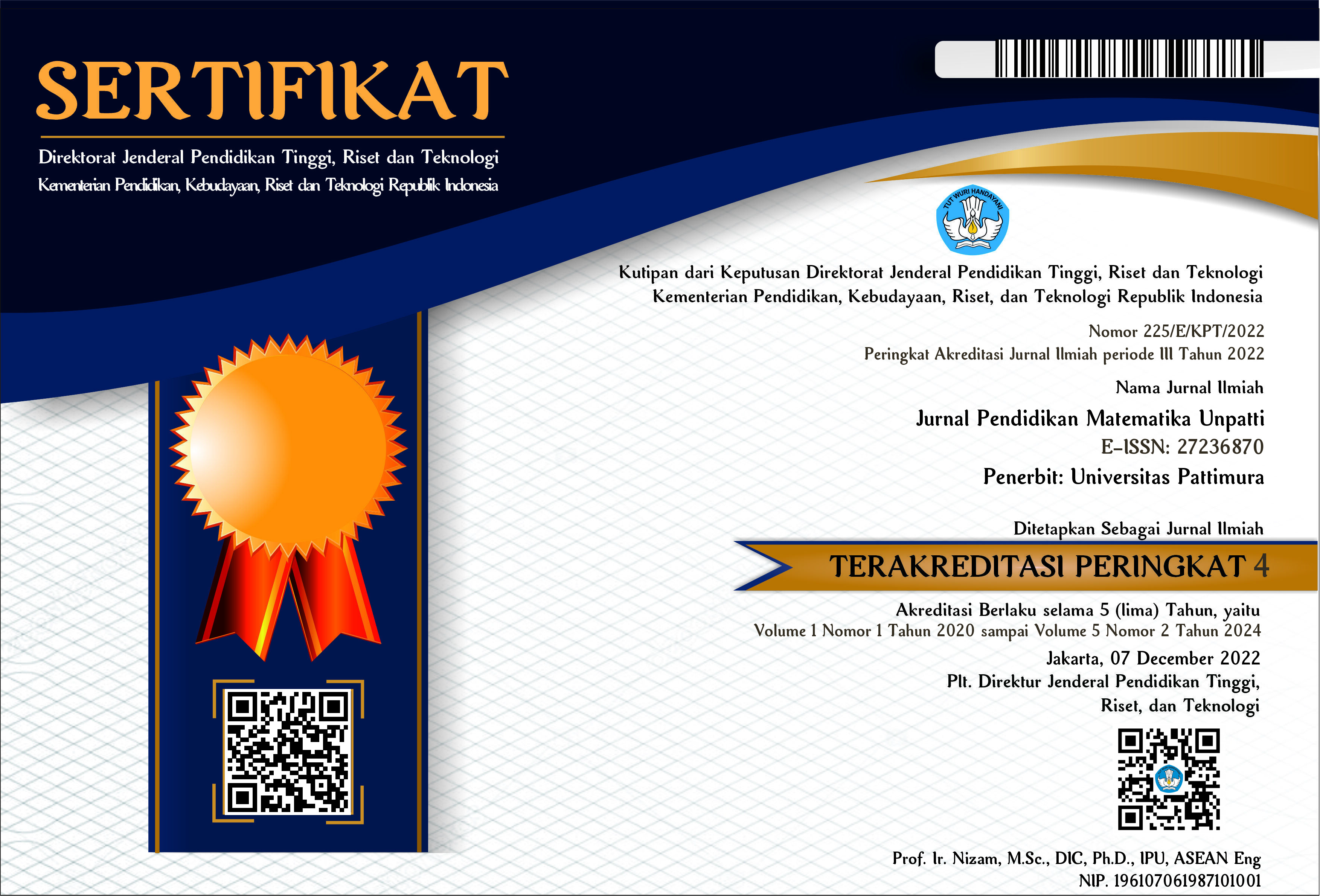PENGARUH SELF EFFICACY TERHADAP PEMECAHAN MASALAH PADA MATERI PROGRAM LINEAR
Abstract
Penelitian ini bertujuan untuk mengetahui ada tidaknya pengaruh self efficacy terhadap pemecahan masalah
siswa pada materi program linear di kelas X SMK Al-Wathan Ambon. Desain dalam penelitian ini adalah
Causal Desaign. Populasi penelitian ini adalah seluruh siswa kelas X SMK Al-Wathan Ambon. Adapun
yang menjadi sampelnya adalah siswa kelas X-Farmasi dengan jumlah siswa adalah 25 siswa, dipilih
menggunakan purposive sampling (sampel tujuan). Instrumen yang digunakan dalam penelitian ini berupa
soal tes pemecahan masalah dan angket self efficacy. Dari hasil analisis dengan menggunakan statistik
regresi linear sederhana, menunjukkan bahwa terdapat pengaruh self efficacy terhadap pemecahan masalah
siswa pada materi program linear di kelas X SMK Al-Wathan Ambon.
Downloads
References
Awaluddin, A. (2019). Pengaruh Self Efficacy dan Self Esteem Terhadap Kemampuan Komunikasi Matematis pada Siswa Kelas VII MTsN 1 Gowa.
Fitriani, R. N., & Pujiastuti, H. (2021). Pengaruh Self-Efficacy Terhadap Hasil Belajar Matematika. Jurnal Cendekia : Jurnal Pendidikan Matematika, 5(3),2793–2801. https://doi.org/10.31004/cendekia.v5i3.803
Hasin, M. (2018). Pengaruh efikasi diri terhadap kemampuan problem solving siswa kelas XI IPA MA Miftahul Ulum Jatioro Lumajang (Doctoral dissertation, Universitas Islam Negeri Maulana Malik Ibrahim).
Hendriana, H, & Soemarmo, U. 2014. Penilaian Pembelajaran Matematika. Bandung: Refika Aditama.
Hendriana, H., Rohaeti, E., & Soemarno, U. 2017. Hard Skills dan Soft Skills Matematika Siswa. Bandung: PT Refika Aditama.
Jatisunda, M. G. (2017). Hubungan Self-Efficacy Siswa SMP dengan Kemampuan Pemecahan Masalah Matematis. Jurnal THEOREMS (The Original Research of Mathematics). Vol 1 No 2.
Khotimah, N. H., Khoirunnisa, A., & Bilda, W. (2020). Pengaruh Self efficacy Siswa SMP terhadap Pemecahan Masalah pada Materi Aritmetika Sosial. EDISI, 2(2), 285-291.
Mawaddah, dkk. (2015). Kemampuan Pemecahan Masalah Matematis Siswa Pada Pembelajaran Matematika Dengan Menggunakan Model Pembelajaran Generatif (Generatif Learning) di SMP. FKIP Universitas Lambung Mangkurat. Volume 3, No 2, Oktober 2015.
Miliyawati, B. 2012. Peningkatan Kemampuan Berpikir Kritis dan Self Efficacy Siswa SMA dengan Menggunakan Pendekatan Investigasi. Unpublished Thesis at Post Graduate Program Universitas Pendidikan Indonesia, Bandung.
Pardimin. (2018). Self-Efficacy Matematika dan Self-Efficacy Mengajar Matematika Guru Matematika. Jurnal Ilmu Pendidikan, 24(1), 29-37.
Rajagukguk, W., & Hazrati, K. (2021). Analisis Self-Efficacy Siswa dalam Penelitian Pembelajaran Matematika dengan Pendekatan Matematika Realistik dan Inkuiri. Jurnal Cendekia: Jurnal Pendidikan Matematika, 5(2), 2077–2089. https://doi.org/10.31004/cendekia.v5i2.761
Sinambela, P. N. (2017). Kurikulum 2013 dan implementasinya dalam pembelajaran. Generasi Kampus, 6(2).
Siregar, N. (2019). Hubungan Self-Efficacy dengan Hasil Belajar Matematika Siswa Kelas Rendah. Journal of Mathematics Science and Education, 1(2), 64-72.
Somawati, S. (2018). Peran Efikasi Diri (Self Efficacy) terhadap Kemampuan Pemecahan Masalah Matematika. Jurnal Konseling dan Pendidikan Vol.6, No .1, 39–45.
Sugiyono. (2014). Metode Penelitian Kuantitatif, Kualitatif, dan R&D. Bandung: Alfabeta.
Ulandri, L., Amry, Z., & Saragih, S. (2019). Development of Learning Materials Based on Realistic Mathematics Education Approach to Improve Students’ Mathematical Problem Solving Abilitiy and Self-Efficacy. Intenasional Electronic Journal of Mathematics Education, 14(2),375-383. https://doi.org/10.29333/iejme/5721
Copyright (c) 2023 Zabir Zabir, Carolina Selfisina Ayal, Darma Andreas Ngilawajan

This work is licensed under a Creative Commons Attribution 4.0 International License.
Jurnal Pendidikan Matematika Unpatti is an Open Access Journal. The authors who publish the manuscript in Jurnal Pendidikan Matematika Unpatti agree to the following terms:
Jurnal Pendidikan Matematika Unpatti is licensed under a Creative Commons Attribution 4.0 International . This permits anyone to copy, redistribute, remix, transmit and adapt the work provided the original work and source is appropriately cited.
This means:
(1) Under the CC-BY license, authors retain ownership of the copyright for their article, but authors grant others permission to use the content of publications in Jurnal Pendidikan Matematika Unpatti in whole or in part provided that the original work is properly cited. Users (redistributors) of Jurnal Pendidikan Matematika Unpatti are required to cite the original source, including the author's names, Jurnal Pendidikan Matematika Unpatti as the initial source of publication, year of publication, volume number, issue, and Digital Object Identifier (DOI); (2) Authors grant Jurnal Pendidikan Matematika Unpatti the right of first publication. Although authors remain the copyright owner.





